#wait i'm trying the other post editor so i can put more than 10
Text

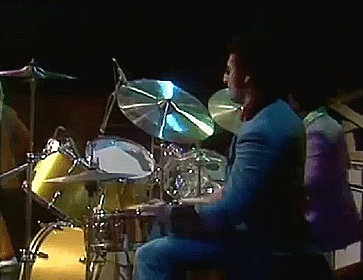




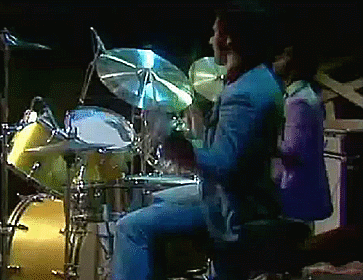




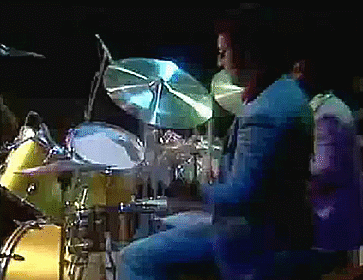

#romeo challenger#malcolm allured#showaddywaddy#musik med gummisko#1976#my boom bang boys#wait i'm trying the other post editor so i can put more than 10#yes good#these aren't big gifs anyway so it's fine#because for some reason drummer's scenes are always super short#which in this case helps me#but i also hate it#i want more and longer drum scenes#forever#on everything#i don't care what band it is#AND STOP HIDING DRUMMERS#IN DARKNESS AND WAY FAR OFF IN THE BACKGROUND#JUST STOP#look at these scene cuts they are always at the exact same time they're basically the same gif over and over but not#i just want to see#MORE#showaddywaddy gifs
3 notes
·
View notes
Text
A Jikook Guide to RunBTS: 112-121
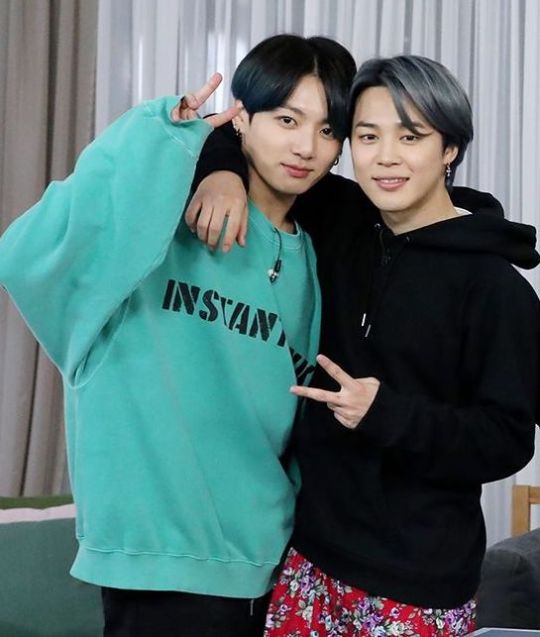
Yes, I'm still doing these! It's just happening more slowly than I'd like because writing for work + writing fic + trying to go to bed before midnight + so much amazing content being released that clearly must be poured over and dissected = less time to make guides. For anyone still with me, he's the next section!
Ep 112 “Dalbang School Part 1” (Ep: 5 / KM: 4)
The ones with BTS in a classroom driving Teacher Jin insane
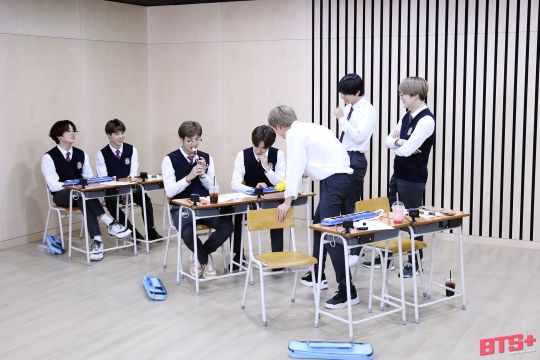
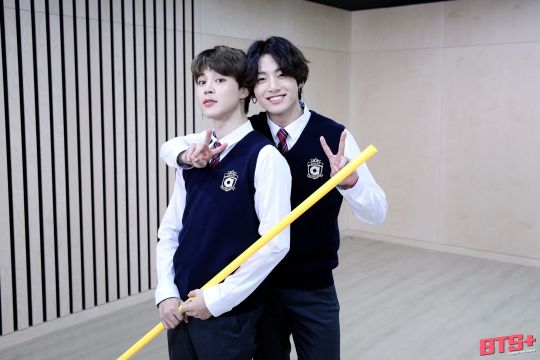
5:58 - JM declares that he and Taehyung will pair up (by being the first to hug each other in a game), but then when Hobi blows the whistle at 6:38, JK runs over to hug JM before Tae can get to him.
6:58 - Jin asks why JM said he wanted Tae and then hugged JK. JM explains that he didn't hug him, he just found himself in JK's hug as JK cackles in the background.
7:24 - When Jin blows his whistle at the class, JK and JM mirror each other in putting a finger in one of their ears.
7:35 - Teammates JK and JM are immediately on the same page about wanting their team name to be Kim Seokjin. When they have to change it, JM quickly picks up JK's suggestion that they call their team Bang Sihyuk.
These don't sound like particularly unique moments, but when you watch it, it just really strikes you how in sync the two of them are in terms of physicality, ideas, and sense of humor.
9:52 - After Jin comments that he heard JM did very well in school, JK adds that JM was the top student. When someone else asks if JM was the best or second-best, JK forcefully reiterates that he was the best student.
12:45 - When they get a question right, JK and JM clasp hands and bump their shoulders together.
13:10 - JM and JK both goof around, speaking in satoori and challenging JHope to a fight of sorts.
13:27 - When Jin repeats that they got the question right, JK and JM do exactly the same as 12:45, but seated this time.
14:22, 14:36, 15:13 - In all three of these moments, JM nearly falls over laughing at something JK did that no one else found anywhere near as funny.
23:36 - When JK says he's good at this game, JM laughs and pokes JK in the chest with a marker.
BEHIND
2:30 - JM takes a selfie of him and JK with his personal phone while they're supposed to be paying attention to Jin.
6:35 - JK cheers on JM and calls him Jimin-ssi when JM announces he's doing well on this spot-the-difference round. When Jimin modifies the brag to say he only found four, JK says "that's still quite impressive."
Ep 113 “Dalbang School Part 2” (Ep: 5 / KM: 4)
4:50 - We all know how JK is when he gets into his "focus" zone, especially in a competitive environment. But here, when JM rather rudely interrupts JK's melodica practice, JK just starts playing around with him and giggles.
7:41 - As RM & JH take their turn, jikook are whispering to each other in the back row.
11:42 - After quickly agreeing on a lunch option, jikook do a high five / handshake thing and then JM says "we think alike" and "we get along pretty well." JK responds "that's exactly it" and the on-screen captions tells us they are a "good match."
22:20 - This is where JK and JM start switching back and forth carrying each other on their backs to get under a limbo stick.
They go again at 23:35, 26:11, and 28:13.
And again at 30:22 and 32:16 and 34:30 because, even though they lost, they want to try to do it again to show that they can as a "matter of pride."
25:00 - JK points something out to JM and then pats his butt.
33:33 - JM announces they lost, and then jikook do another handshake / high five thing.
34:33 - JM does an... interesting pose for the camera where he puts his hand on a bent-over JK's back and smirks.
34:56 - Yet another handshake and JM pats JK on the back when they finally pass the limbo challenge.
BEHIND
5:55 - While examining the limbo setup, JM comments that JK is good at this. JK comes over to give a demonstration and JM watches him be silly with it and says "he's a strange kid" fondly.
6:21 - Another jikook limbo attempt - this one was cut because they did it too easily.
Ep 114 “League of Number One Part 1” (Ep: 3 / KM: 1)
The ones where BTS play games with League of Legends world champions
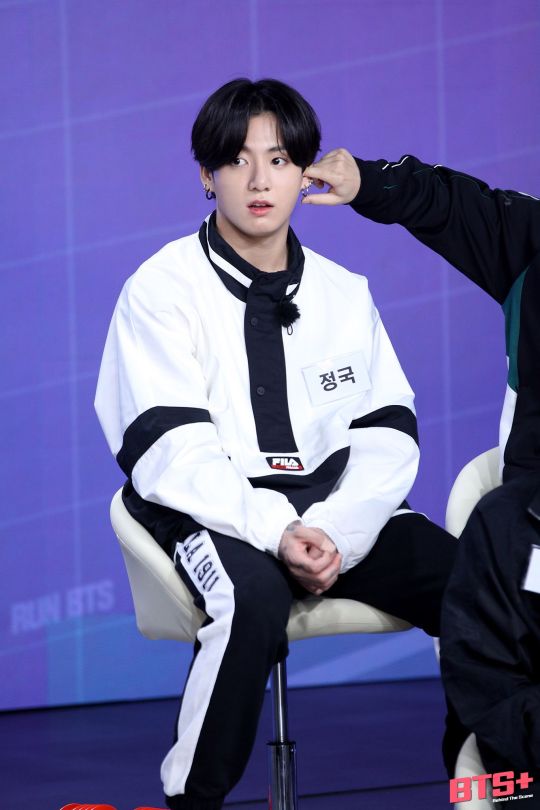
3:55 - After Jimin protests that he shouldn't be out, JK tells his hyung to turn around and face the back.
14:40 - JK fake-boxes JM after losing the hammer game.
18:18 - JK mimics Jimin's BWL intro.
Ep 115 “League of Number One Part 2” (Ep: 2 / KM: .5)
BEHIND
7:05 - JK comes over to check on Jimin's phone to make sure he's actually visible in the selfie the teams take.
Ep 116 “Team-Building Special Part 1” (Ep: 4 / KM: 1)
The ones with random games in that rec room-looking place that are a lot more fun than they sound
22:14 - JM and JK play around with the jump rope during breaktime.
22:26 - JM and JK play around like they're boxing with each other.
BEHIND
5:15 - JK appears to take an interest in watching JM's... back as he moves around acting out potential poses.
Ep 117 “Team-Building Special Part 1” (Ep: 4 / KM: 2)
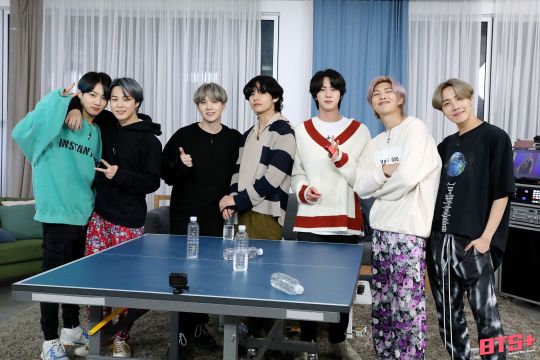
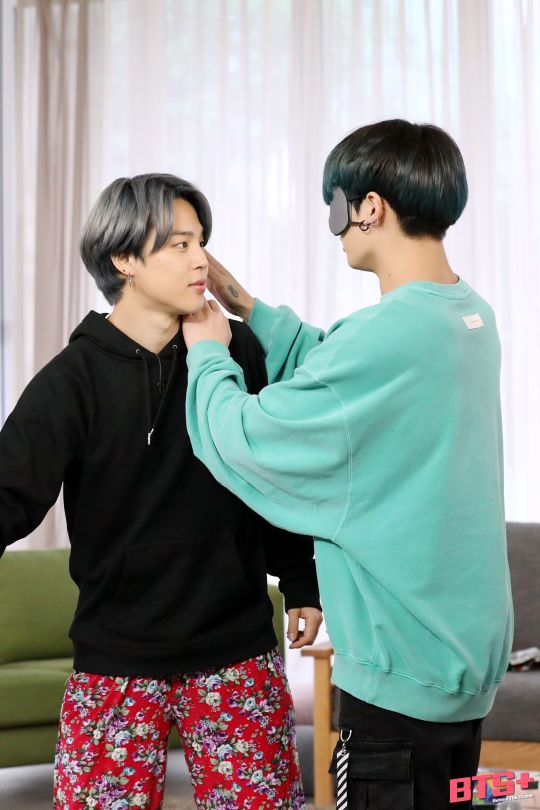
5:30 - Despite showing pretty much everyone else touching everyone else in the pose guessing game, we don't get a single shot here or in the behind of JK feeling up Jimin. The above photo proves that it happened, though, so definitely side-eyeing the editors, here.
BEHIND
5:35 - JK keeps throwing water bottles when they're supposed to be taking a group photo. Jimin pulls him back next to him and puts an arm around his neck. JK puts an arm around Jimin's shoulders in return.
7:51 - After it's explained that JK is staying late to watch Jin do his penalty, a packed-up Jimin comes over and stands next to JK, waiting until they're done to leave.
Ep 118 “Photo Story Part 1” (Ep: 3 / KM: 3)
The ones where BTS play a Samsung-sponsored game involving getting specific pictures while a spy tries to ruin the fun
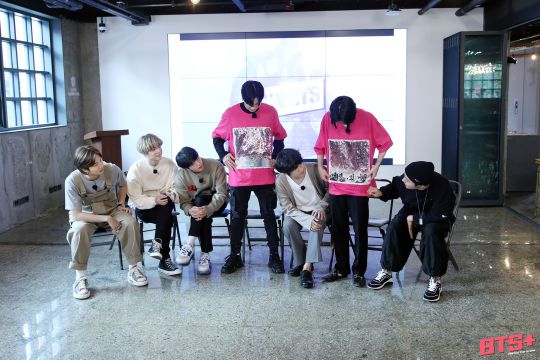
4:22 - JM appears to direct JK to go punish Tae and pats JK's back when he starts to obey. Something happens that we don't see when the angle changes - next thing we see, JM seems to be pushing JK? JM then giggles at JK pretending to beat up Tae. (After this, JK spins around like a ballerina. Not jikook-related, just adorable.)
29:51 - JK calls Jimin twice without adding "hyung."
32:28 - JM pulls JK along by the wrist. Meanwhile, J-Hope once again mixes up their names.
32:44 - Though there is now a group walking slowly together and he doesn't need to pull him along anymore, Jimin takes JK's hand again.
37:02 - There are a bunch of seats open in the room, but Jimin walks over to sit right next to JK.
BEHIND
5:40 - When JM tries to steal a post-it from JK, JK scolds him in satoori banmal. JM calls him out for not calling him with hyung and JK quickly apologizes (in a way some k-army jikookers have said is like how a married person would respond to their nagging spouse!).
6:09 - JK and JM meet up and JK tells JM he's exhausted. There's a kind of weird moment that I fully admit I may be reading too much into where JK seems to be walking right towards JM, then abruptly stops and turns, looking at the camera, before walking with Jimin in a different direction than he had been heading. Then, JM says he thinks their matching shirts are hilarious and that it's funny they're wearing them for the show.
Ep 119 “Photo Story Part 2” (Ep: 4 / KM: 3)
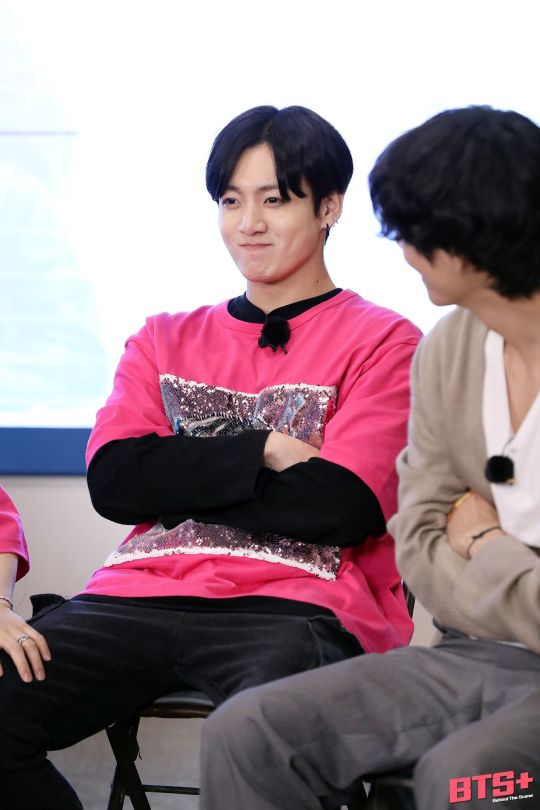
8:21 - "You are me, I am you" moment: Jimin does a ballet spin the same way JK did in part one.
11:18 - JK is the only one to vote for JM to be able to keep a picture in other than Jin (who has nefarious reasons for doing so).
29:40 - JM goes over to help JK see how many of his photos the spy ruined and almost falls over laughing when it becomes clear it's nearly all of them.
34:21 - JM puts his hand on JK's shaking leg to help calm him (see above photo), but JK is so irritated that it doesn't work like it usually does. Poor bunny!
35:17 - JM pulls at JK's shirt and hand, then folds over his back while trying to get him to confess that he actually lost.
38:24 - JM has a comforting hand on JK's neck when he's acting upset about losing.
38:32 - When it seems like JK is struggling to come up with an ending statement, JM helps prompt him.
BEHIND
0:55 - JK talks about how amazing it is that Jimin found so many cards.
3:51 - When JK is playing with the sequin art on the front of his shirt, JM leans over and starts rubbing on them, too.
5:11 - Jimin tells JK that, if he wins, he's going to make the loser hike Mt. Achasan. JK asks why he's looking at him when he says that and they both laugh. Jimin pats JK's chest and they laugh even harder. Jin and Tae both have "omg, these two" looks on their faces.
Ep 120 “Reply BTS Village Part 1” (Ep: 3 / KM: 2)
The ones with a real-life Mafia game inexplicably set in a 1970s village. It's... fairly difficult to follow, but the guys are into it and the outfits are great!
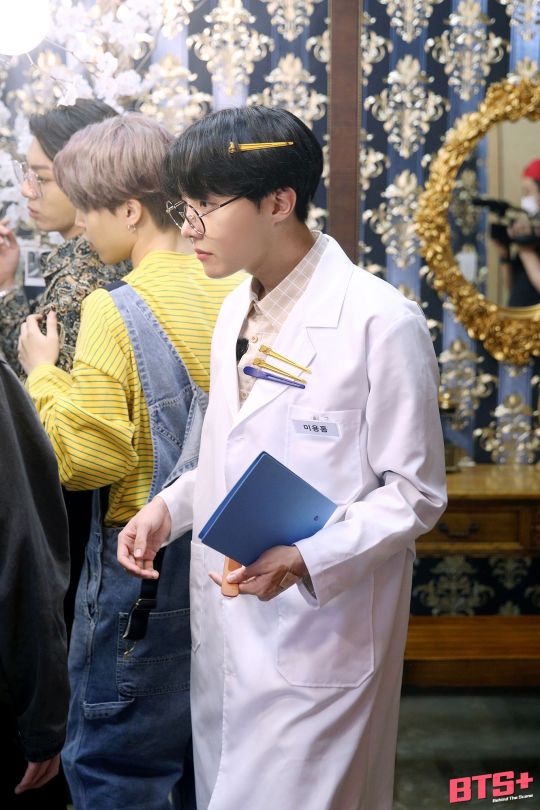
24:40 - Jimin breaks character and laughs when asking JK if he's the culprit.
29:40 - Caption: "The air is undeniably tense between Gamer Jeon and Chief Park."
Not explicitly jikook, I just find it funny that the writers seem to be playing with some real life relationships, making sope best friends and jikook have tension that leads to banter...
BEHIND
5:34 - When Jimin is playing with the yo-yo, JK expresses concern that he's going to hurt his fingers (caption: Kook is just worrying for his hyung). Then, JK asks poutily and in banmal if he can play with the yo-yo multiple times and Jimins says no. Like, JK straight-up gives his hyung a command ("let me try that") using informal speech and no one bats an eye!
5:58 - Jimin starts singing a song about an ants. JK watches him. JK initially says to Hobi "look, he's a fool/dummy!" (in banmal again), then starts singing along. He jokes that JM doesn't know all the lyrics and Jimin says back "quiet, you."
Ep 121 “Reply BTS Village Part 2” (Ep: 3 / KM: 2)
38:48 - After having asked for it a bunch in the Behind of the previous episode, JK now has Jimin's yoyo.
non-jikook note: At the end of this one, they "time travel" to solve a mystery in Joseon-era Korea and I can't express how badly I want to see that. Please come back to that, Run!
BEHIND
0:58 - Jimin and JK play around accusing each other with exaggerated accents and formality. Jimin comes up behind JK and reaches out to touch his shoulder, but stops when Tae joins them and accuses them of plotting together.
9:05 - When JK says everyone else is so good at acting, Jimin compliments him that he was very funny towards the end.
86 notes
·
View notes
Note
Hello! I'm curious to know your opinion. I've been working on this long fic for months. Ever since I started writing there has been a bunch of anon's under different names telling me how to write each chapter. Saying things like "make (A) do this", "(b) needs to do that." "I expect this to happen to (C)" Etc. On one hand I'm grateful for the feedback, after all what writer isn't, but of 10 comments, 9 are like this. I'm starting to feel my writing isn't good enough for my readers.
Hello anon! Elizabeth here. Hooooo boy let me tell you, as I was reading this I went on a **journey**. When I reached “9 out of 10,” I went, “WHAT.” I have a few thoughts, and without knowing the full context (what your story is like, what fandom it’s in, etc etc) some of this might apply and some might not. But I think it’s all generally useful for fic writers and readers to think about.
This actually got pretty long, so I’ll put my thoughts under a cut.
1) The story vs reader expectations
This is something I think about—and talk about—a lot. Here’s a bit of what I said while discussing what “OOC” actually means a few episodes back:
Humans act irrationally, and I think that you can write a character acting irrationally well. But to me, that’s not a character acting out of character. That’s a character acting against character, irrationally... I think when we say “out of character” about characters we’re actually saying something different, which is: “Have you done the work to show why the character would respond to this situation X way or Y way?” And if he responds Z way, and you haven’t done any of the work to show why he might do that or any of the consequences if it is truly out of character the way we would say a real human acts out of character—then very often it is bad writing. It is people taking plot ideas and then imposing them over their characters without earning it.
These conversations are a huge part of our discussions about media in recent years—whether writing choices are good, whether they are earned, whether they are “in character,” whether they conform to what we expected. But the last one is where things get really murky—because there are *a lot* of readers and viewers these days who are kind of doing what I’m accusing bad writers of doing in that quote—imposing their expectations over the story without really grasping what’s been set up by the writer(s).
There are a lot of parts to this. We often pinpoint Lost as the place where the modern audience’s inclination to “solve” a show was born, and this has spread throughout viewing/reading cultures over the past two decades. The rise of “spoiler culture” is a huge factor here, too—as if knowing plot points is the only thing of value when viewing or reading a piece of entertainment. My least favorite thing in all of this is TV Tropes and the kind of rewiring of peoples’ brains to *only* look for those concepts (which are often weirdly narrow and reductive, unlike, say, the more categorical tropes of fic or the romance genre).
Here’s an example: in 2017, Gav and I made our love of Black Sails the centerpiece of our fandom newsletter, The Rec Center, and in the process got a lot of people to watch it. And because we were the ones that inspired them, I had a fair number of people in my mentions/messaging me to give their real-time reactions as they went through the episodes.
While not every single writing choice on Black Sails is flawless, much of it is meticulously done, and so many of the plot points are carefully well-earned. But the things people were guessing would happen next in my mentions...were bonkers. Not everyone! But it was enough people (guessing different things) that I was kind of floored. I would think, If that’s what you think is going to happen next, I feel like you aren’t paying attention to the show? I should clarify that this happened with *a lot* of people, not trying to call anyone in particular out. But so many of the guesses felt like they came from expectations imposed by other media, especially stuff that’s signficantly more formulaic and tropey.
This instinct—to predict, to vocally desire outcomes, to try and get ahead of the writers, to impose the structures of other media over the thing you’re watching—is *deep* in a lot of viewers’ and readers’ minds these days, and it comes out regardless of the quality of the writing. I think it’s not a great turn of events, to be honest—and it leads writers to make some really foolish choices in an attempt to “trick” viewers with something they never could’ve guessed. Which...generally makes for bad writing overall.
2) Expectations within your fic
So this is the part where I falter a bit without context. Because some fic writers make it clear that they are posting as they write, and that they’re open to suggestions for plot choices. I assume you haven’t done this, or you wouldn’t be unhappy that people are trying to dictate what comes next.
I’m curious if you are signalling that you’re...OK? with these kinds of comments by, say, writing nice replies that don’t make it clear that you know where you’re going with the story and you’ve already made choices about what happens next. There’s definitely a way to strike that balance, like a very polite evasion, something like, “Haha, thanks for the comment! I have the whole fic plotted out, so you’ll just have to wait and see!” If you start to signal that you’re in control of the plot, not the commenters, perhaps they’ll chill out a bit—because I gotta be honest, the fact that this is 90% of the comments...is wild to me. And I’m wondering if people are doing it because they see other people doing it.
Again, total speculation without any actual context. I think that this sort of thing is likely more common in certain fandoms and with certain age groups. Even on AO3, fandom is not a monolith—I wonder if you’ve noticed this with other longfics in your fandom. It might be worth checking out how other writers have handled it, if they’re getting flooded with comments like these.
I posted a longish fic recently, 75K over the course of three months, and let me tell you, no offense to any of my commenters, but a few of them reminded me of those Black Sails folks: What story are you actually reading?? I politely pushed back with one who asserted a whole bunch of stuff that was not in the story at all and tried to predict what would happen based on what was frankly bad reading comprehension. With others who expressed expectations about where things would go, I went the, “Haha you’ll have to wait and see!” route.
Talking to other people who’ve posted chapter-by-chapter longfics, I know that some of the bad predictions are par for the course: being absolutely certain the trouble in a section won’t be resolved, being convinced that any hint that the ship may not stay together will come to pass, even when, what, 95% of all shippy fic has the characters staying together? There’s a sort of performativity of immediate reactions in fic commenting, “OH NO, OH NO, ARE THEY BREAKING UP?” Like, duh, not forever. But commenting as real-time reaction is clearly the way a lot of readers engage with fic. Which is fine! That’s different from dictating the plot to you.
3) The commenters vs your story
OK, so conceptually swinging back to the first bit, while my immediate response to, “I'm starting to feel my writing isn't good enough for my readers,” is NO NO NO JUST BECAUSE AN AUDIENCE IS SAYING SOMETHING DOESN’T MEAN YOU ARE BAD AND THEY ARE CORRECT. But! I think it might be worth spending a liiiitttle bit of time with them to see what they are saying, and how you think that connects back to what you’ve written.
When folks came at me with, “I think X will happen next in Black Sails,” I, as a person who’s watched it several times and also professionally deconstructs texts as a critic, can go through and be like, “Here’s why I think that’s a misreading of what you’ve seen so far” (though mostly I would just say things like, “Why try to predict the plot! Just enjoy it!” because I’m trying not to be a dick). Rewatching the show, I can see all the things the writers carefully laid out, and how they pay off eventually. Can I imagine alternate choices for the characters? Sure! But I can see why, with the specific context and stakes in which characters made decisions, the writers had them do what they did. If they made other choices, I’d want that similar sort of work-showing.
Similarly, when I got the occasional comment like this on the aforementioned fic, I would take it seriously for a moment. Why are they predicting this? Is it possible I haven’t shown my work enough? As I was writing, I thought very carefully about the characters and their motivations and the way certain events shaped their choices, and how changing events would change those choices. Generally, those comments felt, well, unearned: they were more about the reader than about the actual story.
It helped having a beta who is both smart and scary, and wouldn’t hesitate to tell me if something wasn’t working. A big issue with the “no feedback in fanfic” convo is decontextualized “feedback” from random readers is not really useful! You have people coming from all sorts of backgrounds, all levels of reading comprehension, all sorts of contexts. Everyone can give you their *reaction* to your work, of course, but without that context of critique—the thing you have with a beta/editor, or if you’re in a writing workshop or group—it’s rare that some rando can give you truly useful feedback.
But! That brings me back to 9 out of 10. I think, with that many people weighing in, it’s worth doing a little bit of serious consideration. Just read back over the story. If you can see ways that you zigged when you were signalling that you were going to zag, then your commenters might have a point. If they’re guessing character X might do Y next, and you’ve planned to have him do Z but actually haven’t done the legwork to make Z seem like a sensible next step, then that might be a fair read. Especially when they say, “I expect X will do Y,” try to figure out to the root of that expectation. Is this about the story, or is it about them?
Because no audience is some neutral set of readers, and fandom even less so. People might tell you to do something because they hate one character and love another. People might hate your ship and for some reason are choosing to read it anyway. People have a million different contexts they bring to reading a work and not infrequently, they are reading through sets of expectations formed by other pieces of media that have very little to do with your own.
4) tl;dr
The ~wisdom~ of the crowd is not inherently greater than the wisdom of the writer. Many people in fandom are very thoughtful readers—probably some of the most thoughtful readers out there! But plenty...are not. And that’s fine! They’re obviously still free to comment. I’d love to say, “ignore them, write for yourself, you’re writing the story you wanna write,” but I know how frustrating this must be for you. So give them a little consideration, but not too much. And most importantly, if you have a beta, ask them their opinion of these comments—and if you don’t have a beta, get one! Because a reader you know and whose opinions you trust is so much more valuable than random anon comments, no matter the circumstances.
66 notes
·
View notes
Note
hi sorry 2 bother u but would u mind explaining a bit more about how ppl in the military are victims? ofc no pressure only if u wanna I'm just curious to learn wht u mean
yeah definitely!
so it starts with predatory recruitment. military recruiters visit high schools and sometimes even middle schools to normalize the idea that joining the military is no different from going to college. almost none of those kids can actually join, but they try to sell them on it anyway with talk of how cool it’ll be and what a badass it’ll turn you into, and stuff like that. the army even has even put out three T-rated video games about army life since 2007, the most recent in 2015.
it gets even more intense in high school, when they start contacting kids directly. when you take the SAT and ACT, your information automatically gets sent to recruiters and they start sending you recruitment literature that blends in really well with the letters you’re getting from colleges suggesting you apply.
then, once people are old enough to actually join up, the recruitment pitch shifts to more tangible offers with little to no intention of ever following through. one of the biggest selling points is the G.I. Bill, but it comes with a whole host of terms and conditions that no one ever mentions, which often results in the benefits being mostly (or even completely) unusable for a lot of people, with just under half of servicemembers ending up using any of it at all.
they also recruit heavily based on the idea that your time in the military will translate into work experience and make it easier to find a job when you get out, but most military equivalents to civilian jobs deal with highly specialized equipment that makes the experience irrelevant, and you don’t get any certifications or equivalencies.
another big draw is Tricare, which is, quite simply, the best insurance in the world. What they don’t tell you is that your dependents get a shitty knockoff, and you also get kicked over to that shitty knockoff as soon as they determine that whatever’s wrong means you won’t be returning to active duty. they want to protect their investment as long as it can fight for them, but beyond that, you can go fuck yourself. and that’s to say nothing of the nightmare that is the VA, which is infamous for multiple-month wait times for even basic care, which is very often poor quality when you eventually do get it.
once you’ve actually joined, a few things happen that the recruiter never mentioned. first and foremost, you’ve entered into a contract with the united states government, which means that any breach of that contract is a federal felony. in other words, everything in this post from here on out is 100% completely and totally unavoidable without utterly fucking up your life.
the second is that you are now subject to two entire sets of laws that, most likely, you had no idea existed until just now. lots of those laws are standard federal law that only applies to military personnel (title 10, mostly), but the rest are called the Uniform Code of Military Justice (UCMJ). a lot of the ucmj is pretty straightforward stuff that you’d expect, like “it’s a crime to disobey orders” (Article 92) and the like, but there’s a ton of general conduct laws as well. for example Article 88 - Contempt Toward Officials, which says:
Any commissioned officer who uses contemptuous words against the President, the Vice President, Congress, the Secretary of Defense, the Secretary of a military department, the Secretary of Transportation, or the Governor or legislature of any State, Territory, Commonwealth, or possession in which he is on duty or present shall be punished as a court-martial may direct.
in other words, if you’re an officer it is literally a crime to criticize the government, even in private and even if you’re not in uniform. more generally, though, all military personnel have their political activity severely restricted by a combination of articles 10, 2, and 18 of us code, DOD directives, and military regulations. from this article, here’s a list of some things that you’re not allowed to do if you’re in the military:
Participate in partisan political fundraising activities, rallies, conventions (including making speeches in the course thereof), management of campaigns, or debates, either on one’s own behalf or on that of another, without respect to uniform or inference or appearance of official sponsorship, approval, or endorsement. Participation includes more than mere attendance as a spectator.
Use official authority or influence to interfere with an election, affect the course or outcome of an election, solicit votes for a particular candidate or issue, or require or solicit political contributions from others.
Allow or cause to be published partisan political articles, letters, or endorsements signed or written by the member that solicits votes for or against a partisan political party, candidate, or cause. However, letters to the editor are allowed.
Serve in any official capacity with or be listed as a sponsor of a partisan political club.
Speak before a partisan political gathering, including any gathering that promotes a partisan political party, candidate, or cause.
Participate in any radio, television, or other program or group discussion as an advocate for or against a partisan political party, candidate, or cause.
Conduct a political opinion survey under the auspices of a partisan political club or group or distribute partisan political literature.
Perform clerical or other duties for a partisan political committee or candidate during a campaign, on an election day, or after an election day during the process of closing out a campaign.
Solicit or otherwise engage in fundraising activities in Federal offices or facilities, including military reservations, for any political cause or candidate.
March or ride in a partisan political parade.
Display a large political sign, banner, or poster (as distinguished from a bumper sticker) on a private vehicle.
Display a partisan political sign, poster, banner, or similar device visible to the public at one’s residence on a military installation, even if that residence is part of a privatized housing development.
Participate in any organized effort to provide voters with transportation to the polls if the effort is organized by or associated with a partisan political party, cause, or candidate.
Sell tickets for or otherwise actively promote partisan political dinners and similar fundraising events.
Attend partisan political events as an official representative of the Armed Forces, except as a member of a joint Armed Forces color guard at the opening ceremonies of the national conventions of the Republican, Democratic, or other political parties recognized by the Federal Elections Committee or as otherwise authorized by the Secretary concerned.
Make a campaign contribution to, or receive or solicit (on one’s own behalf) a campaign contribution from, any other member of the Armed Forces on active duty.
Any activity that may be reasonably viewed as directly or indirectly associating the Department of Defense or the Department of Homeland Security (in the case of the Coast Guard) or any component of these Departments with a partisan political activity or is otherwise contrary to the spirit and intention of this Directive shall be avoided.
most of that list comes from DoD Directive 1344.10 (full text here) and while there’s plenty of stuff you can do, politically, but almost all of it requires you to be either anonymous or passive about it. so now it’s illegal for you to do anything substantial toward changing policy in any way, and possibly also to even so much as complain about the president or call congress incompetent.
so now that you’ve been properly restricted (and remember, the only way out of this without a felony is with a DD214 (discharge paperwork)) you’re put to work. on the surface, it seems like any other job, but there’s subtle differences. for one thing, literally every person who’s gotten more raises than you is your boss and you have to do whatever they tell you unless it conflicts with what someone who’s gotten even more raises than them already told you to do.
your orders can also be literally anything that’s not illegal. if your boss at starbucks tells you to always stand on one foot while you work the register, you might do it for like an hour or two, but then you’d stop bothering and if your boss got upset about it then that would be unreasonable. if your CO tells you to always say the pledge of allegiance in Farsi, then it’s your responsibility to learn how to say it in Farsi and always do so until that CO or someone above them give you permission to say it in english again, and if you don’t, that’s a crime.
what that means is that if you get assigned to recruitment duty, you can and will be ordered to look and sound excited about being in the military as you tell 13 year olds they should join up after high school, and you will legally have to do it.
and all of this is without even mentioning the missions. combat, and the act of killing another human being, are traumatizing even in the most ideal of situations. if someone breaks into your home to attack you and you push them back and something heavy falls on them and kills them, that’s still a traumatic experience for you. even legitimate wars for good reasons against enemies that really do need to be stopped are horrifying experiences for everyone involved.
but when the war is bullshit and most of the casualties are civilians and you know all this and aren’t even allowed to say anything about it, let alone do anything about it? that combines with combat to royally fuck a person up.
this is the part where everyone who’s read this far gets ready to jump down my throat about how the people being bombed are the real victims and not the people dropping the bombs, so let me remind you that this anon was in response to a post i made that started with the words “The US Military is […] evil” and that im not in any way trying to say that the troops get the worst of it, just that they are being used and abused by the system.
because remember, those troops have been groomed to be recruited since they were five years old and asked their parents why they got veterans day off from kindergarten, and have been pursued more and more actively all the way up through high school. the military lured them in, is chewing them up, and will spit them out when it’s done with them without giving one single fuck about them.
and no matter how you cut it, that describes a victim.
#the us military is my culture of origin#military personnel and military brats are my people in a way that no one else is#and for better or for worse nothing can ever change that. not even my realization that#fuck the military tbh#wild doge appeared. much wow
7K notes
·
View notes
Note
You mentioned piracy in a recent post and I'm curious. How do you feel about pirating things you simply don't have access to? For a very long time the anime Evangelion was not available anywhere new. Your options as a American were to either buy expensive used DVD's or pirate it. Even Crunchyroll didn't have it. Eventually a Japanese (no subtitles) blu0ray release was made, but it was costly. Finally Netflix got the rights to host it. Before that though could you fault anyone for pirating it?
Overall I’m solidly pro-pirating media because every interaction with a text comes down to the same question: Can I buy it or not? If you can buy it then you give money to the artists who rightfully deserve it and that’s fantastic. However, if you can’t buy it and abstain from engaging with the media at all you’re potentially losing more than just your own enjoyment. What does that mean? It means that:
Maybe I wasn’t able to pay to see the first film, but pirating the first got me interested in the series so now, two years later, I’m paying to see the second when I have more funds.
Maybe I wasn’t able to pay for the monthly streaming service hosting this TV show, but now that I’ve pirated it I’m buying related merch.
Maybe I wasn’t able to buy this book, but I downloaded it, told all my friends about it, wrote a positive review, and potentially set the stage for other copies to be sold.
You are, in short, functioning like a fandom: you created a thing, I love the thing, I’m going to ‘pay’ you for that thing in ways other than cash and credit.
Pirating isn’t quite the same thing as walking into a store and snatching a book off the shelf. In that scenario you’re harming the author’s potential (or expected) revenue as well as the very real costs that the store put into buying that book in the first place. When you pirate you’re only cutting into those potential profits--profits that still wouldn’t exist if you’d said, “Well I can’t pay for it so I won’t watch/read it at all.” Now, I want to emphasize that none of the above examples are a justifiable replacement for funds. There’s a reason artists on tumblr rightfully say, “No. You’re paying me for my commission. ‘Exposure’ isn’t a valid form of payment.” What I am saying is that there’s a massive difference among a) not being able to pay for a show created by a major corporation so you gain nothing and give nothing back, b) pirating that major show and giving back in the ways that you can, and c) trying to “pirate” art off of a 21yo college student who’s just looking to buy groceries. Yes, every artist deserves to be paid for their work regardless of whether they’ve sold two copies or two million, but---while a lovely and worthwhile sentiment--that doesn’t acknowledge that a lot of people just can’t. That money isn’t going to end up in the artist’s pocket regardless.
Ignoring for a moment the fact that a good chunk of us are Millennials/Gen Z and can’t pay for shit anyway, other reasons you might be inclined to pirate include:
You literally do not have access to this. At all. I’m a grad student out in Ohio. There is no way I can pay/take the time to go to NYC and see Hamilton play. I can, however, download a recording of the show and then buy the soundtrack.
Similarly, costs are not always just the cost of the media itself. My closest movie theater is a small, non-profit place that doesn’t always play the latest blockbusters. The closest AMC where I could see those blockbusters? That’s an Uber drive away. I can’t afford that on top of a $10+ ticket.
As we’re seeing now, most people can’t afford to pay a monthly fee for multiple different streaming services. The content isn’t all in one place? We’re only going to pay for a portion of the content then. Just buy cable? Distributors need to acknowledge that we’re moving away from that format too. Most people don’t want media laden with commercials anymore, or media that requires equally expensive, specialized tech to play it on. “Specialized” here meaning it only exists for entertainment. I need my laptop to do my job. Being able to watch stuff on it is a bonus, but I’d need to pay for a laptop whether it could play films and TV or not. Actual televisions though? They only exist as a form of recreation. They’re a pure luxury.
A common rebuttal here is, “Just buy the DVD.” Except, as said, I don’t own a TV. And Mac took out their DVD player in order to produce another expense by forcing people to buy it separately. Which I haven’t done yet. So not only are DVDs functionally useless to me at the moment, but it’s the same issue as above: the overall price is far more than the cost of the media alone.
Sometimes---as you point out, anon---the material is simply not available in your country. It might never be available. Maybe it will be, but that’s years from now...and telling someone to wait years to see the thing all their friends are currently invested in is not the most compelling argument.
Also yes, sometimes media stops being produced and the price skyrockets. I’ve had books I desperately wanted but they were well over $100 used for an otherwise cheap paperback. (Funds that, notably, also wouldn’t be going to that original author, editor, cover designer, etc.)
People have always had a complex and murky definition of what amount of profit is “enough” for an author. And we need to acknowledge that. Because if we all collectively believed that every individual really had to pay for their own access than we would never lend books to friends. We wouldn’t sell used. Or allow music on Youtube. Or have libraries. No one would ever share their Netflix login. We would be far more concerned with eliminating ALL forms of “free” access if we were truly that concerned with a 1:1 transaction. Whether people want to admit it or not, there’s a middle ground between “making sure an author is fairly compensated for their work” and “making sure that people have access to the media at all.”
It all comes down to how you’re defining that fair compensation and yes, I do think it makes a difference who the author is and what sort of compensation you’re offering. I buy all my books because pirating those tends to do more damage than pirating TV. Complicating that, I have a Netflix account and watch One Day At a Time there because they need ratings a whole lot more than Breaking Bad does. However, I pirate John Oliver because I can’t afford an HBO account on top of a Netflix account.
Which brings us to, “Then you shouldn’t watch John Oliver at all. That’s a privilege, not a right, and if you can’t pay for it then you don’t get it.” But here’s the thing: media is important. We do need it. We need stories, almost as much as we need food, water, and shelter. It’s easy to say, “You can’t pay for the Popular New Thing so you don’t get to engage with it” and a lot harder to convince people that they should accept that situation when they’ve found access to it another way.
You know all that research proving that when given a basic income most people still choose to work? Same principles apply. When people have access to money they will spend it on entertainment. Always. I buy books. I go out to the movies. I buy music on iTunes. I go see plays when I can. But the “when I can” portion is a complex and, for many people, rather rare scenario. I guarantee you, it’s not a dystopian future of, “If we accept piracy then no one will ever buy anything ever!” because most people want to pay artists. They want to support films like Captain Marvel. They want to buy a hardcopy book to put on their shelf. They want another copy of that film to gift to a friend. But there are times when they simply can’t do that... so what are we left with? The issue is much less a moral one than a practical one. It comes down to that original question: Can I pay for it? Most people don’t go, “I can pay for it but am choosing not to because I’m a horrible, greedy person.” They go, “I can’t pay for it so you’re not getting my money regardless. The only question now is whether I’ll lose the enjoyment of your art and you’ll lose anything that I might have given back---even if what I have to offer doesn’t mean as much to you as money.”
8 notes
·
View notes
Text
Twitch Safety Tools for Smaller Streamers
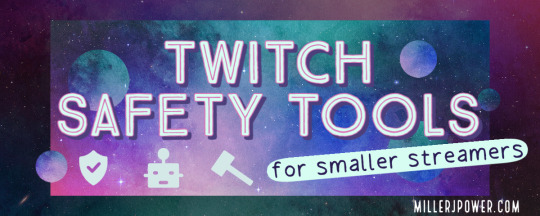
Hate raids, doxxing, and follow bots are not a new thing on Twitch, but their reach and domination is increasing. More and more these things are affecting smaller streamers who never expected anything like this to happen to them. Especially now with the identity tags, marginalised folks with upwards of 10 viewers need to be on their guard and are scared to go live.
By no means do I think it should be the responsibility of the streamer to try and protect ourselves from this level of danger, especially when Twitch is owned by one of the most powerful companies in the world. However, at the moment looking after ourselves is the only option if we can't or don't want to leave the platform.
If you would like to read my thoughts on the current state of Twitch you can read them here. This post will just be going through my tips and tutorials for safety measures on Twitch without spending money or having a huge mod team.
Of course there are loads of tools out there, I'm not saying these are the ultimate ones but the ones I have found easy and useful.
Hate Raid Button
The number one thing that has helped me avoid the worst of hate raids is my hate raid button. You may have heard of the pricy hardware Stream Deck. Well there's a much cheaper way to achieve it to allow you to have useful moderation tools, change scene, and do all sorts of things at the touch of a well labelled button! I use Deckboard which is free, or £2.79 for the Pro version with more buttons. I use an old tablet to run mine, but you could use a phone or just run it on your computer.
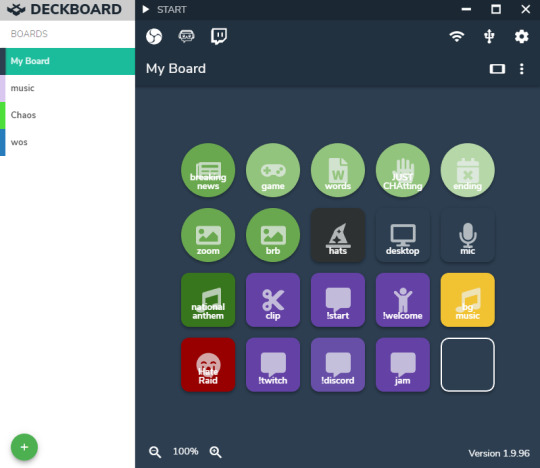
I won't give a full tutorial of how to use it here as it is pretty self explanatory (although let me know if that is something you would want!), but I will talk you through the hate raid button I have made as it's a little more complicated.
Click an empty spot to make a new button, and name it what you want.
In the action menu select "multi actions" and press the button below "open editor".
Click "add action" then "Clear Chat" action
Click "add action" then Subscribers or Followers only.
Click "add action" then "Send Chat". In the "send" box spam an emote code 100 or more times (remember to put spaces!). This is so if any viewers have BTTV and doesn't get chat cleared, any nasty messages will be removed from their view.
If you can separate your follow alerts from your other alerts and make them two separate browser sources. Then you can click "add action" then "toggle source" and select each of your scenes that have alerts and then your follow alerts. When you press the button it will turn off your follow alerts so all the nasty usernames don't show up on your screen. If you can't separate your alerts, just select your alerts source on each scene.
Do the same if you have your chat on screen. Use "toggle source" to turn off on screen chat on any scene you have it.
Commander Root Blocklist
By now you've probably heard of Commander Root, and it's ups and downs. And while I use it and find it very useful, there are risks in using it. So I will explain it's uses and risks here.
I use Commander Root for it's blocklist manager. You can paste in lists of usernames to block, or select "block all known bot accounts" to block every bot on their list. This not only bans the accounts from your channel, but stops them from following you at all. And unlike on twitch, it can do huge lists at once rather than you having to go one by one.
You do this by pressing the green button "add new blocks" and then paste your list in the text box, or press "block known bot accounts".

I haven't had any problems with Commander Root blocklist, and I think it has really helped reduce my amount of hate raids. However, it is not recommended by Twitch and many people have had problems with it.
One problem you shouldn't ever have is losing all your followers. This is a problem with Commander Root's follower remover which I recommend staying well away from if you want to keep your legit followers.
However, Commander Root's blocklist can get you shadow banned from Twitch, meaning that you can only chat in channels where you're a mod or VIP for a while. Like I say this hasn't happened to me, but it can happen so it is your choice if you want to take that risk.
Another mild issue is, once you have used the blocklist tool once, it can take ages to load the page again. But, be patient! It will load eventually.
Twitch's offered alternative is that when you do get hate raids to clip them and report them to twitch. Twitch will then remove those accounts from the site altogether. This does work, amazingly! But I am not a fan of it as a method, as I want prevent hate raids not put a bandage on it after it happens. That said, plenty of people have had success with this method after waiting a couple days, so it is a good option if you don't want to risk the shadow ban.
Running a Mod Team
If you can, it is good to have a small mod team even if you don't have a huge audience. It means that if there is any trouble it doesn't need to throw you off what you're doing. Here are a few tips for running a mod team.
Make sure you have clear, easily accessible guidelines for your mods to follow. Mods are less likely to take action in a difficult situation if you don't explain to them what you would like them to do. By telling them something simple to follow like "we have a 3 strike system, break the rules once is a warning, twice is a time out, and three times leads to a ban" makes it so much easier for them to do their job. Explain your rules to your mods and why you have them so they can better understand how to protect your space.
Make sure your mods are people you can trust with that responsibility. If you're thinking of taking on mods you don't know so well, I recommend making an application form with questions like "why do you want to be my mod?" and "what important things do mods do?" so you know that they are there to be responsible.
Communicate with your mods. Make sure you have a group chat where they can talk about what's happening on stream and ask questions about mod procedures. If you would like them to do something differently, tell them! They're not psychic.
Treat your mods with huge respect! They are doing hard work for free and they don't owe you anything. If they can't make a stream, need a break, or just aren't feeling it for a little while you should affirm and respect that. Treat your mods to fun games nights or treats every now and again so they feel valued!
I hope you can find this useful! If you have any questions feel free to leave them in replies, or tweet at me on @PytharGames!
If you would like to support my work and keep it free for everyone, you can tip or subscribe to support here.
0 notes
Text
I was 35 when I discovered I'm on the autism spectrum. Here's how it changed my life. by Zack Smith on January 29, 2016
"Do you hate crowds, especially at supermarkets and restaurants?" I avoided eye contact, which I knew I wasn't supposed to do. "Yes." If Dr. P. noticed, she was too busy looking at the questionnaire to let on. "Do you tend to repeat heard words, parts of words, or TV commercials?" I immediately flashed back to middle school, randomly repeating such phrases from TV as, "I don't think so, Tim," from Home Improvement. I was tempted to respond that way this time. Instead, I just replied with another, "Yes." "Do you have trouble sustaining conversations?" "Yes." "Is your voice often louder than the situation requires?" "Yes." "Do you find yourself resistant to change?" "Yes." "Do you have restricted interests, like watching the same video over and over?" "Yes." "Did you start reading and/or memorizing books at an early age?" Eye contact suddenly became much, much easier. "Wait — isn't that a good thing?" "It is. But did you do that?" I went back to boring a hole in the carpet with my eyes. "Yes." "Have you ever picked up and smelled random objects, like toys when you were younger?" "That's a sign?" "Sometimes. Did you do that?" "...yes." I wanted to puke. After a few more questions, she did some totaling. "Well," she finally said, "it's likely you have ADHD and social anxiety disorder, and you're on the autism spectrum." I slumped back into the overstuffed chair. "Great," I said. "Triple threat." I was 35 years old. There are, according to the Autism Society of America, 3.5 million Americans with autism spectrum disorder, approximately one in every 68 births. Based on reports compiled by the Society, the prevalence of autism has increased 119.4 percent just from 2010 to 2014. Courtesy of Lydia Brown and the Autism Self-Advocacy Network We’ve called autism a disease for decades. We were wrong. The research linking autism to vaccines is even more bogus than you think The errors — and revelations — in two major new books about autism It's not that more autistic people were suddenly being born. It's that doctors knew what to look for. A Danish study published in January 2015 suggests that diagnoses of autism are more frequent because of a broadening of diagnostic criteria over the years, meaning there could be generations of people with autism spectrum disorder who were never diagnosed. I knew, on some level, that I was autistic by the time I was in fifth grade. It wasn't because of Oscar winner and box office sensation Rain Man, which I was too young for; it was, of all things, a Baby-Sitters Club book called Kristy and the Secret of Susan, where one of the babysitters tends to an autistic girl. I don't recall all the details, but I do remember reading the book and asking my mom if I was like this, if it was why I needed "curriculum assistance" classes or why I'd been pulled from preschool and sent to "Project Enlightenment," an ultra-structured children's program downtown. Mom assured me I was not like that. Susan never spoke, and that wasn't me, was it? I moved on. I was already neurotic about reading "girls' books." By the time I reached college in the late 1990s, a new term had become a buzzword: Asperger's syndrome. I wondered if that was what I had. It explained so much — the obsessive memorizing of TV show trivia, the absolute discomfort at bars, clubs, and parties, the way I'd tune out most classes or social situations. Again, I was assured by my parents and friends who knew people with autism — that wasn't me. I had empathy! And I was doing well in school, I just needed to relax a little. In retrospect, they seemed more worried about how worked up I was over this than the possibility of an actual diagnosis. There's a stigma attached to autism that leads many families to avoid a diagnosis. But in attempting to diagnose yourself, it can feel like the things that make you unique are aspects of some sort of affliction, one that is permanent and incurable. A few years later, a good friend of mine was diagnosed with Asperger's. Then he told me he thought I exhibited some symptoms as well. I freaked. I had finally started to feel "normal." I had a job, I was finally comfortable with things like driving and calling up strangers for interviews — I was just a "late bloomer!" I broke down and told him I still cared about him, that I didn't see him differently, but that I didn't have what he had! I was finally growing up, I said. I didn't have some incurable disorder that separated me from everyone else. But I worried. Friends didn't quite know what to say when I brought up the possibility, often in tears and just short of hysterics. "You're just you," they'd say. Mom and Dad were practical: "Well, what if you are? What good does it do you to put a label on yourself?" They weren't being mean. They reminded me, over and over, that I was "doing well." They'd already seen me fall into periods of depression and nonproductivity when I was out of school and out of work, and didn't want me to return to that place. I'd pulled myself out of those spirals before they became too serious. But if a doctor told me I'd never be "normal," that my strangeness was something pathological, would that be the excuse I needed to turn into a complete lump? I was just one of those people who did "better" when I was busy, when I had structure. I just needed motivation. That was all. Eight more years passed. Asperger's became a fear, a phantom, and most of all an excuse. The idea that I might have this "condition" lurked in my mind. It was why I messed up, the nuclear option. If someone got upset with me because I didn't understand something or missed some hints they were trying to give me, I had, "Uh, I might have Asperger's" ready. It broke up at least one relationship. It prevented several more from happening. I was in a strange place. By that time, I'd made good connections — even friendships — with a wide variety of creative people. But other parts of my life felt paralyzed. My creative work was stalling. Setting and keeping any kind of schedule for myself resulted in overstuffed calendars and quick burnout. There were all the times I'd walk away from an encounter with someone new with the overwhelming feeling I'd done something wrong and had no idea what it was. If someone did get mad at me, I'd obsess over it, frozen in a moment of shame and self-hatred long after the other person had let it go. If I could succeed without the pills, that was proof that I'd "won"I considered therapy. But good cognitive therapists were expensive, and it seemed wasteful to potentially drain what little money I'd saved trying to quell what I told myself were such minor neuroses. Surely I could just power through my own problems. In the past, times like these usually ended when I had enough work — school, employment, personal projects — to keep my mind busy, unable to obsess over small things and let myself get "nibbled to death by ducks," as one editor put it. Ultimately, I persuaded my doctor to prescribe me some generic Zoloft. My parents were terrified I was going to have the miscellaneous "suicidal thoughts" the prescription warned about. I didn't, but it was a mixed bag. On the one hand, I felt a bit calmer and had more luck with work and dating. On the other hand, I still faced problems with depression, falling asleep in the middle of the day, keeping an irregular schedule. I'd been dieting for the past year and change, but now I had trouble taking and keeping weight off. Worst of all was that I couldn't feel excited on almost any level — I'd sit through TV shows and movies like a stone. I rarely felt attracted to girls. When I kissed one, it was like kissing my own hand. There was no sensation, just motions. Zoloft, it seemed, could get me a second date but didn't make me a lot of fun on the third. I started skipping pills or going off my prescription for a while entirely, saving a month's refill so I could use it if I knew I had a stressful period coming up. Inside my brain, the relief at not having to face "judgment" was twisted up with self-hatred and fear, along with a perverse sense of defiance. If I could succeed without the pills, that was proof that I'd "won." When I went off the stuff, it felt like second puberty — I'd go from clean-shaven to Wolfman Jack in a week. I felt excited again. I also felt like I was on a toboggan, headed down a snowy hill, accelerating faster and faster toward a brick wall. And I couldn't get off, because I liked the feel of the rush. Cleaning out my email folder, or seeing old social media posts on Timehop, it's amazing how many times I made the same complaint over and over: I needed to get something finished, or I needed a new project. I needed to get out of the house more, to spend more time around people, to stop being so hard on myself. Something needed to change in my life, or I needed to change in some way. I said so over and over, but I didn't know how. 10 things I want to teach my autistic son before he goes to college In January 2015, I started what I knew was going to be a stressful period. I was teaching a volunteer course for retirees once a week, taking a graduate course twice a week, and taking shifts at a used toy shop other days of the week, on top of my freelance writing and creative work. It was a lot, but I knew I could handle it. It took exactly two weeks for it all to collapse. Exactly one year ago today, I showed up for a shift at the used toy shop and was promptly fired. I'd been there two years, I was told, and still had no sense of what to do when they didn't explicitly tell me. I had all these other gigs writing and teaching, they said, and this clearly wasn't a priority. Worst of all, customers had complained: They preferred not to come in when I was behind the counter, ready to chat their heads off. Fridays, when I worked, used to guarantee the company a few hundred dollars of retail at least, and now there were records of multiple Fridays with no sales at all. I was costing my boss money because people didn't want to be around me. I'd failed at what was a fairly easy job because I was me. Because I wasn't fit to be around other people. My parents were due to arrive for a visit in two hours. I went home and felt all the symptoms that had hit me in the past take over: crying jags, nausea, coughing fits. I knew I wasn't sick; these symptoms were all in my head. But I didn't know how to turn them off. When my mom and dad arrived, they were understanding. But I told them I couldn't go on like this. I needed to get therapy and get on medication again, this time prescribed by a mental health professional. Research was done. Dr. P. was recommended as a specialist in the area, good at diagnosing spectrum disorders and helping people organize their lives. A few weeks later, I was answering questions about whether I picked up and smelled toys as a child. Decades after I'd begun diagnosing myself, it was official. But somehow I didn't feel "labeled." That sense that I was "wrong," that I was somehow deficient, wasn't there anymore. Instead, I finally understood the areas where I had problems, and why I had those problems. Now I could work on them. The psychiatrist Dr. P. sent me to said that we could try Strattera, the ADD medication I'd attempted in college, in conjunction with Prozac. Tony Soprano and "Here comes the Pro-Zack" jokes flashed through my head. The insurance company rejected Strattera, but they told the psychiatrist I could do Adderall and see if it worked. "If you have a bad reaction, we can apply for Strattera again!" the psychiatrist said, cheerful. It was a lovely thing to know I was taking a medication with the expectation that I would have a bad reaction to it, but it turned out I didn't. I could listen without feeling an absolute, overwhelming need to blurt something outThe first month was rough. I'd wake up throughout the night, an odd change from wanting to sleep all day. Instead of eating whenever I got stressed or anxious, I wasn't hungry, something I wouldn't realize until early afternoon, when the dizzy spells kicked in. For the first time in who knows how long, I found myself doing things like getting up at the same time every day and eating breakfast. Weird. Other things stuck around. The nervous coughing fits I developed with my firing continued, but a friend noted that they seemed to vanish when something held my attention. When they happened again, I'd find something to focus on, like a song or a TV show or something to read. Eventually they vanished, and when I would cough nervously about something I found I could overcome it right away. Little things became easier, too. Arguments with other people didn't stay in my head months after the issue had been resolved, reminders that I could push other people away. I started dating more, and if it didn't work out, I was able to move on with some new understanding. Errands were done. Garbage got taken out. Annoying forms were filled out, instead of lingering on my desk for months. If I had a weekend with some downtime, I felt an actual compulsion to leave the house or call a friend, instead of simply sitting around. Within a few months, I realized that while I still didn't feel the excitement I could with no medication, I could still enjoy things. I could follow the plots of movies and TV more easily, and when other people spoke, I could listen without feeling an absolute, overwhelming need to blurt something out. I asked Dr. P. what this feeling was. She said I was "content." I kind of liked that. The strangest part of all this has been that being honest about my autism has left other people unfazed. It'd come up, probably because I found some excuse in the conversation to mention it ("Oh, I know what you mean about hating small talk. I'm a little on the spectrum, so..."), and there'd barely be a reaction. I'd watch people's faces. No surprise. No discomfort. And the conversation would go on. Admitting that there were things I didn't understand somehow created a new common ground. No one fully understands everyone else, or the world around them. Many people try to do what I did and "power through" this with false confidence and assertiveness. Sometimes it works. But to know you have a weakness, to acknowledge it, and to treat it as a "what the hell" thing —that's almost more powerful. For most of my life, I'd been afraid discovering I was on the spectrum meant I was cut off from being able to maintain friendships, professional contacts, a romantic connection. It was the wall I was always afraid I was headed toward. But the real wall was my fear, of facing not what I was but who I was. And my parents had been right — I was doing well before. I just needed to find a way to let myself enjoy my successes and build upon them, instead of feeling like defeat was inevitable. In the end, 2015 was perhaps the best year of my life. It wasn't the major stuff — the new job I got teaching, getting accepted full time into the graduate program — it was just that I was able to feel a sense of momentum, of moving forward. Part of me wishes I'd had this happen a decade before. But the experiences I had without therapy and medication helped prepare me for the setbacks I faced, and granted me the maturity to face them. My story isn't typical. The autism spectrum is a broad and constantly redefined place, a frontier of the mind that's still mostly wilderness. The revised definitions of it in the DSM-5just a few years ago are still controversial — it's both easier to diagnose aspects of the spectrum in people and more difficult to determine if a formal diagnosis is necessary, if it's even a "problem." In my experiences I had the benefit of privilege, and of personal choice. No one forced me to get diagnosed or to take medication. I simply reached a point in my life where I felt like I could become a better version of myself if I confronted the areas of my life that seemed to hold me back. I can't say that my life is perfect. I have a great deal I need to accomplish in terms of better dieting, regular exercise, and being more productive in my writing. Some anxieties still hijack my brain, and dating and relationships remain, as they do for most single people, confusing. But I feel like I've learned. And I'm still learning. Learning is all about realizing possibilities in the world around you, and right now those possibilities seem extraordinary. In August 2015, Dr. P explained, slowly and with caution, that she was moving out of state to join a new practice and to be closer to family, so I'd need to change therapists, and that she'd help with the transition. She was relieved when my main reaction was to tell her I understood and congratulate her on the new opportunity. She called me a "success story." "A few months ago, you might have felt ... destroyed by upheaval," she said. "Things change," I replied, and I meant it.
3 notes
·
View notes